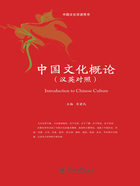
第一节 自强不息的进取精神和“和而不同”的宽容精神 Section 1 Persistent Enterprising Spirit and Tolerance of“Harmony in Diversity”
自强不息的进取精神是中华文化的基本精神之一。“自强不息”一词最早出现在距今两千多年以前的《易经》中,它说,“天行健,君子以自强不息”,意思是天道运行刚劲雄健,与此相应,君子应力求进步,发愤图强,积极进取,永不停歇。这是自强不息的进取精神的真实写照。它说明自然界是不断地向前运行和发展的,君子应以此为榜样,自强不息,努力向上,以便与自然界的发展规律协调一致。
Persistent enterprising spirit is one of the basic spirits of Chinese culture.The word “persistency”first appeared in the Book of Changes more than two thousand years ago in which it said:“Gentlemen should be persistent and self-reliant before success”,which means that natural law is powerful,accordingly,a gentleman should strive for progress,be positively enterprising and persistent and never give up.This is a real portraiture of persistent enterprising spirit which shows that the nature is constantly running forward and that a gentleman should be based on this model, be self-reliant and work hard in order to coordinate with the developing law of nature.
中国长期的统一与中华文化中自强不息的进取精神是分不开的。中国文化中自强不息的进取精神,增强了民族的凝聚力和向心力,在两千多年的历史发展长河中,一直鼓舞着人们奋发向上,不断学习,不断前进。无数仁人志士,为了维护国家统一和民族团结,坚持与内部的邪恶势力和外来入侵势力作不屈不挠的斗争。诸如 “剑外忽传收蓟(jì)北,初闻涕泪满衣裳。却看妻子愁何在,漫卷诗书喜欲狂。白日放歌须纵酒,青春作伴好还乡。即从巴峡穿巫峡,便下襄阳向洛阳”(杜甫:《闻官军收河南河北》)式的激动; “出师未捷身先死,长使英雄泪满襟”(杜甫:《蜀相》); “遗民忍死望恢复,几处今宵垂泪痕”(陆游:《关山月》)式的感慨都是以高度的自信自尊而表现出来的自强不息精神。 “大禹治水”妇孺皆知,大禹三过家门而不入的精神成为中华民族自强不息的典范。自强不息的进取精神是中华民族特有的精神气质,成为激励中华儿女不断开拓进取的永恒的精神力量。正是这种自强不息的进取精神,培育了中华民族的自立精神和反抗压迫精神,以及中华一体、国家一统的精神。中华文化这种自强不息的精神,鼓舞着中华民族不断进取,也推动了中华民族的发展。

The long-term unity of China is partly due to the persistent enterprising spirit of the Chinese culture which has enhanced the centripetal and cohesive force of the nation,which has been inspiring people to exert themselves,to constantly learn and move forward in the long history of more than two thousand years.Myriad people with lofty ideals have adhered to struggle indomitably with internal evil forces and external invasion and oppression forces in order to maintain the unity of the state and the national unification.This may be reflected in some poems,such as “In Jianmen when I heard government troops had recovered Jibei,my tears streamed down on my clothes.Looking back at my wife and children,I found they did not look worried any more.I felt on the top of the world as I put away all the books.In the daytime I sang happily in a loud voice and indulged in drinking.With the beautiful spring scenery all around I'll return to my long- awaited hometown.I will set off right now,passing through Ba gorge,Wu gorge and Xiangyang area to the former capital city of Luoyang.”(By Du Fu)“But he did not win after sending armed forces to suppress the State of Wei and died of illness in the army.For a long time heroes have shed tears for this.”(Also by Du Fu)“The submerged people are looking forward to the restoration of the state,many of them are in tears tonight! ”(By Lu You)in which unyielding and persistent spirit with self-confidence and self-esteem is embodied.The story King Yu Tamed the Flood is widely known in which King Yu's spirit was reflected as a model of the Chinese nation.Persistent enterprising spirit is the characteristic of the Chinese nation and has become the eternal spirit of Chinese people constantly forging ahead.It is the persistent enterprising spirit that has nurtured the spirit of self-reliance and resistance against oppression and the spirit of national integration and unification.It is the persistent enterprising spirit that has been inspiring and promoting the continuous development of the Chinese nation.
“和而不同”中的 “和”,指不同事物之间的搭配、融合、平衡,以达到最为圆满程度的一种状态。例如音乐,五音的高低疾缓臻于完美,就称为 “和”; 又如饮食,五味的多寡浓淡搭配得宜,也称为 “和”; 又如身体,阴阳之气平衡饱满,也称为 “和”。
“和而不同”是一种宽容的态度。 “和而不同”一语出自《论语》, “君子和而不同,小人同而不和”。戚戚小人的外同而内不和,决定了他们只能以 “小”称之。而坦荡的君子内在要求的一致性成就了他们的 “君兰”美名。他们以其包容的态度理性地接纳各门各派的观点、精神思想,奠定了中华民族五千年的思想文化根基; 以更大的胸怀迎接外来文化,吸取其长处,成就了博大精深的中华文化。
In “harmony in diversity”,“harmony”refers to the collocation,integration and balance between different things to be in best status.Such as the high-low and fast-slow tune of the music, the thick-light taste of the diet,the yin-yang balance of the qi in the body can be called “harmony”.
“Harmony in diversity”is an attitude of tolerance which comes from Analects of Confucius, “The gentlemen aim at harmony but not at uniformity.The mean men aim at uniformity but not at harmony.”The mean men with harmony outside but uniformity inside can only be called “mean” while the inherent requirement of the consistency of the gentlemen has helped themselves to win the reputation of “orchid”,with whose attitude of tolerance they rationally accept various views and thoughts,which have laid the ideological and cultural foundation for the Chinese nation; they greet foreign culture warmly,absorbing its merits and integrating it into the extensive and profound Chinese culture.

“和而不同”的包容精神,既是一种君子之风,也是协调君臣关系、君民关系的准则,同时还适用于处理国家、民族以及各种文化之间的相互关系。早在《尚书·尧典》中就有 “克明俊德,以柔九族。九族既睦,平章百姓。百姓昭明,协和万邦。黎民于变时雍”的记载,主张用 “和”的方式对待族群和邦国。 “协和万邦”,需要承认差异性并互相包容,其中所体现出来的原则,正是 “和而不同”。包容和智慧无处不在。大地以其宽阔的背脊支撑万物,成就大自然的绚丽多姿; 海洋以其伟岸的胸怀接纳百川,成就大海的博大稳重; 天空以其无垠的胸襟包容云朵,成就了蓝天的自由与宽广。在历史的长河中,“和而不同”的包容精神内化成为中华文化的基本精神,赋予了中华文化海纳百川的气魄。无论是儒、道思想的互融互补,还是佛教文化与中国本土文化相激相荡而最终成为中华文化的组成部分,或者对我们的思想带来强烈冲击的西方文化仍然能够被中华文化加以化解并有效吸收与融会贯通,都体现了中华文化的包容精神。今天,“和而不同”仍是各种文化交流的基本原则。正如汤一介先生所言:“如果我们希望中国文化得到更好的发展,如果我们希望中国文化今后能对人类文明有所贡献,就必须以 ‘和而不同 ' 的态度对待其他民族、国家、地域的文化,充分吸收他们的优秀文化成果,更新自己的传统文化,以创造适应现代社会生活的新文化。”
The tolerance of “harmony in diversity”refers not only to the demeanor of the gentlemen but to the norms of coordinating monarch-subject and monarch-common people relationships.It may be also used for dealing with the co-relationship among states,nations and cultures.There were related records in the book Minister—Stories About Emperor Yao.“Examining past events in ancient times,we get to know that Emperor Yao is named Fangxun,who serves for common people respectfully and encourages frugality,who is moderate and tolerant and does well in governance.He is honest and diligent,and gives room to better men so that he is very popular among the common people.He carries on virtues and unites family members closely,perceiving political affairs of other peoples and coordinating the relationship among the governors.Thus,the common people unite themselves closely together.”He advocates harmony to treat the ethnic groups and neighbor states.To coordinate the relationship among the governors,one needs to acknowledge differences and mutual tolerance, which reflects the principle of “harmony in diversity ”.Tolerance is ubiquitous,wisdom everywhere.The earth nourishes everything on its broad plateaus and ridges and makes the nature colorful; the oceans take in the waters in its grand bosom and makes the sea vast and stable; the blue sky embraces the clouds and makes itself free and broad.In the long history,the tolerance of “harmony in diversity”has internalized the basic spirit of the Chinese culture and endowed Chinese culture with the spirit of all rivers running into sea.The mutual complement and integration of Confucianism and Taoism,the collision and fusion of Buddhism and local culture has eventually formed a part of Chinese culture.The western culture bringing strong impact on our thoughts can still be resolved and taken in into Chinese culture.All of these have embodied the spirit of Chinese culture.Today,“harmony in diversity”is still the basic principle of all the cultural exchanges.As Mr.Tang Yijie puts it:“If we want to make a better development of Chinese culture,if we want our culture to make a contribution to human civilization,we must take the attitude of‘harmony in diversity’towards the culture of other ethnic groups,nations and regions,fully absorbing their achievements in culture,updating the traditional culture of our own so as to create a new culture adapting to the modern social life.”